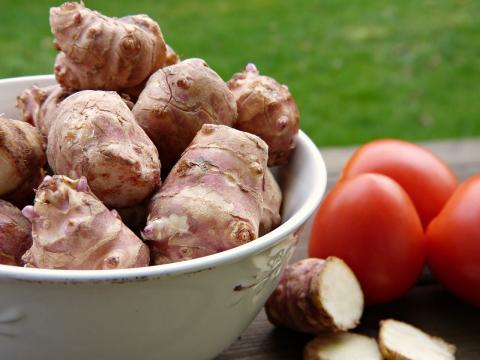
The Jerusalem artichoke is neither an artichoke nor has it any connection to Jerusalem. It is the tuber at the root of a flowering plant of the aster family and is native to North America. The flower is similar to the sunflower and the tuber, much like that of ginger, with a texture of a potato. In 1585, Sir Walter Raleigh came upon the plant cultivated by the area peoples of Virginia. It was later discovered by Samuel de Champlain in 1605 when he found them in the gardens of the Native Peoples in the Cape Cod area who called them sun roots. In his opinion they tasted like artichokes and brought them back to France with that name. The plant was brought to Italy in 1633 where the term “girasole,” the Italian word for sunflower, was used to reference the food. This later evolved into the word Jerusalem. The tuber sustained the Lewis and Clark expedition and fed the people of Europe during the famine of 1772 and sustained them during World War II.
The Jerusalem artichoke can be easily mistaken for ginger root but that is where the similarity ends. It has a mild, sweet flavor with the texture of a potato and edible skin that is difficult to peel. The plant was correctly identified by Artemas Ward, an American grocer, in 1911 as a tuber that could be pickled, boiled or eaten raw.
The plant can easily be grown from tubers that have been sprouted. They must be planted approximately three to four inches deep in the spring or early summer and harvested in the fall. It is advisable to plant them in isolated plots because they tend to take over a garden and become a serious weed problem.
Jerusalem artichokes are chock-full of health benefits, including fiber, vitamins and minerals. These tubers are rich in antioxidants and oligo-fructose inulin, which is a zero calorie saccharine that does not metabolize in the body. It has been a part of the arsenal of holistic healing used for treating many maladies due to its nutritional content.
Here are five more reasons to add Jerusalem artichokes to your diet:
- Jerusalem artichokes can be used to control insulin levels in the body because of their moderate glycemic value. Ingesting the tuber will moderate blood sugar levels, preventing sharp rises and falls of blood glucose. This results in lowering the risk of many health issues like heart diseases, stroke, diabetes, fatigue, mood swings and food cravings.
- There is a high content of inulin, a pre-biotic fiber, which has many beneficial properties. It stimulates the growth of Bifidobacterium, the good bacteria found in the large intestines that feed on the harmful bacteria. This prevents constipation and boosts the immune system, as well as reducing the risk of colon cancer.
- Adding to the health benefits of the digestive tract, Jerusalem artichokes are high in B vitamins – specifically thiamine (also known as vitamin B1). This vitamin is important to many of the bodily functions that contribute to a healthy nervous system and muscular system, and it also moderates the metabolism and regulates digestion.
- The high content of potassium in Jerusalem artichokes keeps down the risk of heart disease and helps the function of the muscular system. It also improves bone health and reduces the risk of osteoporosis. Potassium also is beneficial for those who ingest a large quantity of commercially salted foods.
- Jerusalem artichokes are a good source of iron, copper and vitamin C. Iron oxygenates the cells in the body including hair and reduces the risk of anemia. Copper stimulates hair growth, reduces the risk of hair loss, and prevents premature graying. Vitamin C is helpful in absorbing iron and contributes to a healthy vascular system.
There are many ways to prepare Jerusalem artichokes, like slicing them into salads or baking them as one would prepare a potato. They can be found in health food stores, supermarkets and in co-ops as either Jerusalem artichokes or sunchokes. The may be packaged or displayed in bulk; however, it is not a popular item so be sure to inspect them for freshness before purchasing. Fresh Jerusalem artichokes should be plump and not sprouting or have a greenish tinge. If they are shriveled or molding, do not buy them. They will keep for approximately two weeks wrapped in plastic in the refrigerator.








